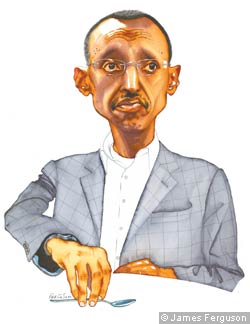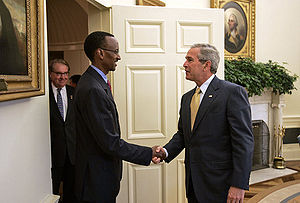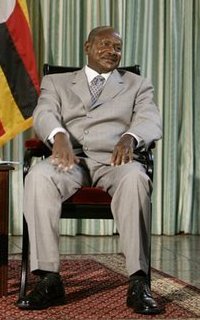 Paul Kagame
Paul Kagame, 53, has been president of Rwanda for the past decade and vice-president – and
de facto leader – for seven years before that. But for all the power and years of command he appears as lean and austere as he was as the 36-year-old guerrilla commander of the Rwandan Patriotic Front, a rebel army that fought an end to the 20th century’s swiftest act of mass murder – the killing between April and July 1994 of some 800,000 Tutsis and Hutu sympathisers.
In the years since, we have met a number of times but this is our first lunch: the president is visiting London and suggests meeting at the Wyndham Grand in Chelsea Harbour, an expensive but unremarkable hotel not known for its restaurant. Our meal is to be prepared by a chef travelling with the presidential party. Kagame’s aides assure me in advance that this is not out of fear of being poisoned. Rather, they explain, it is for organisational reasons – feeding the entourage and past experience with the vagaries of hotel catering – and I half-believe them. Kagame’s administration, which has approached development with the same single-mindedness as it approached guerrilla warfare, is nothing if not well-organised.
The country that Kagame took over had collapsed, its institutions and people abandoned or destroyed during the genocide. In the ensuing years his government has overseen the return of millions of
Rwandans displaced by conflict; hundreds of thousands of genocide crimes have been tried by village committees (see box below).
And, with the help of international aid, on which the government still depends for nearly 50 per cent of its budget, Rwanda has seen some of the highest growth rates in Africa. Yet no African leader divides opinion as sharply as Kagame does or inspires such contrasting caricatures: on the one hand, the visionary statesman, forging prosperity out of ruin and courageously tackling continental taboos; on the other, the blood-stained tyrant. He is accused of war crimes and human rights abuses at least as often as he is celebrated with honorary doctorates and global leadership awards.
The polemics are fuelled by Kagame’s mixed record. Unlike many of his African peers, he has relentlessly pursued results in his bid to transform an inward-looking mountain nation into a regional centre for services, agro-processing,
tourism and transport. But he has also been given extraordinary licence to repress dissent, and the prosperity of elites in Kigali derives at least partly from the plunder of minerals from the Democratic Republic of Congo during Rwanda’s serial invasions of its neighbour.
According to United Nations reports, tens of thousands of Rwandans and Congolese died at the hands of Kagame’s army as he established authority and secured his country’s borders in the face of continuing threats to surviving Tutsis. Political opponents and journalists still end up in exile, jail or, in some cases, six foot under.
Yet Kagame can count among his international supporters the likes of Tony Blair, Rick Warren, the evangelical US pastor, and Howard Schultz of Starbucks among other influential figures in the west. Members of his fan club tend to overlook the more troubling aspects of his rule or support the notion that he has done what was necessary to restore security and lay the foundations for development.
In the anonymous, faintly ascetic meeting room at the Wyndham Grand, where we are about to be served carrot and tomato soup, Kagame says, “I have no regrets about being who I am, and being what I am in my country for my people. No regrets at all.” The round table where we are to eat, bedecked with white cloth and silver cutlery, is something of an oasis in a desert of empty carpet.
The wider global setting is more compelling: Kagame, though relaxed, is not a man for small talk and our conversation moves quickly to the conflict in Ivory Coast,
revolutions sweeping the Arab world and the ramifications of both for sub-Saharan Africa. “These are not problems that just emerged yesterday: they are problems which people were not paying attention to because it suited their own interests not to,” he says of the corruption, social injustice and repression that fuelled the Arab uprisings.
Such a statement might raise an eyebrow among his detractors, coming as it does from a head of state who has yet to allow a strong opponent to rival him, and who in 2001 locked up his predecessor
Pasteur Bizimungu, when he formed an opposition party. But the attention Kagame has focused on developing Rwanda’s essentially peasant economy has fostered the shoots of a remarkable recovery for anyone bothered to observe it closely. Few of Kagame’s detractors do, something he finds infuriating.
Fiercely defensive of the moral high ground, he is not shy of playing on western guilt at having failed Rwanda in its hour of need. “I don’t think anybody out there in the media, UN, human rights organisations, has any moral right whatsoever to level any accusations against me or against Rwanda. Because, when it came to the problems facing Rwanda, and the Congo, they were all useless,” he says, quietly emptying his soup bowl.
Weary of the problems associated with being a recipient of international aid – from the patronising, bullying tactics of donor nations to the often fickle nature of their policies in
Africa – Kagame has developed an acute sensitivity to western mendacity and double standards. He also has a strong sense of irony. So it is with a wry laugh that he suggests that the historic focus of western governments on stability over freedom and good governance in the Arab world has had its comeuppance. “They have to face the reality now I think. They just can’t ignore it ... ”
If there is a broader lesson from the Arab Spring for countries south of the Sahara, he continues, it is in what happens to those in office who do not pay attention to the interests of their people. “You can be up there, talked about, appreciated all over the world, with people singing a lot of songs about you. But if you don’t measure up and you are not really connected with your people ... it will explode in your face, no question about it.”
Next on the menu chosen for us by his chef is steak, with beans, green peppers, rice and potatoes. It looks fortifying, so I introduce an awkward comparison. Bahrain, ruled by a Sunni minority distrustful of a majority Shia population now in open revolt, could, I suggest, be compared to Rwanda, with its administration dominated by a minority – ethnic Tutsis, who make up around 14 per cent of the population and were victims of the 1994 genocide. Not unlike Bahrain’s ruling elite, Rwanda’s fears real democracy would lead to majority rule and that this would invite chaos given the history of extremism among majority Hutus.
Kagame reacts sharply to the comparison. For one, he is not a monarch, he says, like King Hamad bin Isa al-Khalifa. But, I murmur, you were
elected by a remarkable 93 per cent of votes only last year, facing no real opposition.
“In Rwanda there is a constitution. There are term limits; there is a parliament, there are elections. Somebody who makes that comparison, I will just say is ignorant,” he insists, defending the near unanimous result of last year’s polls as a vote for stability in the context of the country’s peculiarly bloody history.
Yet international concern is, if anything, mounting over whether the peace and economic growth Kagame has established is sustainable alongside a political system that remains rigidly controlled.
He continues with a tactic often deployed by African heads of state but which in this instance seems somewhat disingenuous: to harp on the exaggerated expectations made of developing nations by the west and the west’s failure often to meet the same exacting standards. “Why isn’t the majority in the developed world interpreted on the basis of race or colour or tribes? Why? You want to tell me that, in the United States, Barack Obama comes from which majority?” he asks.
We reach a point of agreement when we decide that had Rwanda been an oil-rich state like
Libya it is unlikely that UN peacekeepers would have backed off when mass murder started as they did in 1994. We also agree that in the case of
Ivory Coast, the elections that sparked this year’s conflict were premature, symptomatic of the pressure applied on African nations to import political systems that are not always suited to local circumstance.
“Elections must be held. But when? You don’t carry out elections anyhow, or under any conditions,” he says, pointing to the fact that Ivory Coast was divided when the vote took place under UN supervision in November, with rebels in control of the north, and a government army in the south. “It’s as if elections or political processes were things worked out in a factory ... They can’t be made in the UK; they can’t be made in America. No. If you force it, you end up with a problem.”
The waiters remove our empty plates, and replace them with bowls of fruit salad with oranges, pineapples and blackberries. We find another point of agreement: had we been almost anywhere in Africa, the fruit would have tasted a great deal sweeter. “Pineapples are very bland here,” says Kagame. “And the bananas are different.”
As coffee is served, I ask Kagame a question that intrigues me. He has skilfully courted the evangelical Christian community in the US, a factor that I am told helped swing the Bush administration to his side, after a frosty start. But is he himself a believer? “Yes and no,” he says. “I encourage believers to believe.”
The complicity of members of the Catholic church in the Rwandan genocide partly inform this doubt. There were priests among the killers. “I’ve seen religions make blunders. Let’s look at what the Catholics did in Rwanda, which still disturbs me,” he says. “You see the Catholics apologising for child abuse by priests and bishops, and the Pope has gone out of the way to apologise to the Americans. Then he goes to Australia and does the same. But they will never apologise for their role in the Rwandan genocide.”
For all the blame he heaps on the outside world for turmoil past, he tailors much of his rhetoric these days to chime with the times. He is acutely conscious, for example, that Africa will only catch up if Africans themselves live up to the task. He singles out the leaderships in Ethiopia, Gabon and Burkina Faso as like-minded. “People will patronise us but at the end of the day we have to remember it’s our problem,” he says. “Africa should not just wait to be exploited or influenced. No. We should be part of the conversation. We should raise ourselves to a level where there are certain terms we dictate in the conversation because we have a lot to offer.”
It is partly Rwanda’s meagre resources, he continues, that has made it so imperative that it behaves differently, that it roots out petty corruption and improves the business climate if it is to compete. And it has, becoming one of the world’s fastest reformers, rising to 66th out of 178 countries in the World Bank’s ease of doing business rankings. “We are landlocked, a very small country, in the middle somewhere. Some of our neighbours, they are richer than us, and they tend to attract people more than we do. So we have to strategically create uniqueness about us.”
Unique too, is the ruling Rwandan Patriotic Front, which grew out of the rebel movement he led to power from exile in neighbouring Uganda. It is one of the best endowed political movements in the world. Funds it controls own large stakes in key sectors of the Rwandan economy, including telecoms, banking, real estate and energy, as well as investments abroad that were launched when his movement was still in the bush. Kagame puts the RPF’s wealth at several hundred million dollars. “We don’t go out begging. For example, we didn’t have any money from Gaddafi for our elections ... And the reason is really we want to maintain our independence all the time in everything we do.”
That is one of the paradoxes about Rwanda. The country has depended on foreign donors to rebuild in the wake of 1994. Yet it is focused, as much as any aid-dependent African country, on becoming self-reliant. And its leader, despite the debt he owes to many foreign allies, never appears anything but independent-minded. “We’ve dealt with our problems very unconventionally and because we’ve had to do that,” he says – adding that this has often infuriated foreign partners who would like everything done their way – “it’s a struggle all the time.”
William Wallis is the FT’s Africa editor
..................................................
Wyndham Grand
Chelsea Harbour, London SW10
Menu prepared by Paul Kagame’s chef
Tomato and carrot soup x 2
Steak x 2
Mixed vegetables
Sparkling water
Bread rolls
Total (including service) £83
..................................................
Jason Stearns on transitional justice in Rwanda
‘Killers now live side-by-side with families of their victims’
Rwanda has long stood out as an extreme case in the fractious debate enveloping post-conflict justice. What do you do in a country with 800,000 victims and probably around 200,000 culprits?
President Paul Kagame has approached this challenge with hard-nosed pragmatism. The new regime obviously couldn’t prosecute all the killers, nor could they let them go. The court system was in a shambles; most lawyers and judges were dead, in exile or tainted by the old regime. For years the new government run by the Rwandan Patriotic Front (RPF) arrested many but prosecuted few. By 1999, 120,000 people were jailed under hellish conditions. It was estimated that the courts would take more than a century to clear the backlog.
In 2001 the government launched a new approach, setting up 11,000 courts around the country, drawing on a traditional form of justice called
gacaca. This process is now coming to an end. More than 400,000 people – more than 10 per cent of the country’s adult Hutu population – have stood trial. Most of those convicted have been given reduced sentences or been sent home, having served time in pre-trial detention.
This solution, even according to Kagame, is far from perfect. Killers now live side-by-side with families of their victims, and there are stories of villagers abusing the
gacaca system to settle scores. This is the post-genocide landscape in Rwanda, a cobbled-together compromise, a fractured society held together by tight government control. But there is a far more troubling problem with this approach to justice: It has been almost entirely one-sided. The
gacaca courts, the United Nations tribunal and Rwandan national courts have not tried any crimes committed by the RPF government. The government has insisted the few crimes committed by the RPF have been tried in military courts. In any case, they argue, any crimes were an utterly different nature and order of magnitude.
This is not a matter of moral equivalence – the government was not guilty of atrocities on the same scale as its predecessor. But there is more evidence to suggest that RPF abuses were not isolated acts of revenge. A UN report into RPF killings in 1994 has resurfaced, suggesting there could have been as many as 40,000 killings by the new government in that year alone. Only 32 RPF soldiers – two of them officers – have been prosecuted for 1994 crimes.
Jason Stearns is author of ‘Dancing in the Glory of Monsters: the Collapse of the Congo and the Great War of Africa’ (PublicAffairs)  Image via Wikipedia
Image via Wikipedia







 By Mamadou Kouyat
By Mamadou Kouyat







